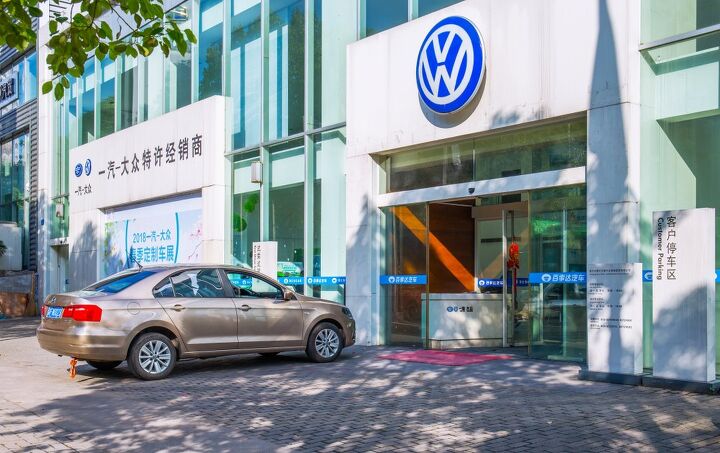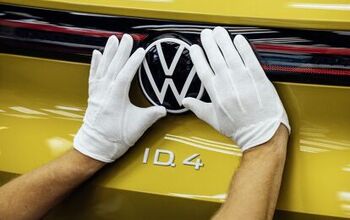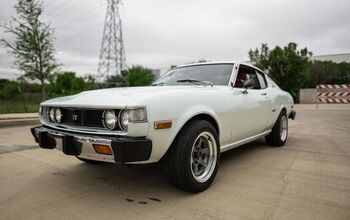Will China Help Volkswagen Out of This Hole?

Volkswagen Group has announced that its sales declined 23 percent against the previous year, to 2 million deliveries, from January through March of this year. Based upon last week’s assessment of the ailing European market, the region seems to have contributed quite a bit to VW’s downfall. However, the company said it is optimistic that the Chinese market will soon recover as the coronavirus pandemic loses strength in the region.
As the manufacturer’s largest market, Volkswagen has a lot riding on China coming out of this in once piece. There certainly have been a surplus of articles claiming the nation is on the fast track to economic restoration, but we’ve also heard enough conflicting reports on the status of its convalescence that it’s difficult to feel confident of anything. What exactly is in store for VW and other automakers doing business in China?
According to Reuters, good news awaits then all. Stephan Woellenstein, Volkswagen’s boss for China, told the outlet that sales reductions stemming from COVID-19 complications started slowing in April:
Referring to the country’s car market overall, Woellenstein said the decline in sales in April was estimated to be between 15 [percent] and 20 [percent] from a year earlier, while the drop in March, at the height of the pandemic, had been 40 [percent].
“If things continue as they do now, we could have reached last year’s level again in June,” he said. “We see a normalisation with view to the summer.”
Volkswagen’s sales were faring slightly better than the Chinese market as a whole, he said. But any further recovery hinged on whether Beijing implemented economic relief measures.
While China planned a sizable relief package for the coronavirus outbreak, the figure was readjusted to $394 billion USD (converted from RNB), with most of it going directly to businesses. The nation had already spent quite a bit to prop up its industrial and tech sectors, amassing no shortage of debt in trying to make itself the dominant global economic force. China’s National Bureau of Statistics says there would be room room to raise the annual budget deficit ratio, but added it was best to exercise caution. Meanwhile, the country’s National Development and Reform Commission, finance ministry, and the central bank have all stated that a deficit ratio above 3 percent would be undesirable — even though the stimulus package seems guaranteed to make that happen.
A minor issue, truth be told. Even though China’s financial situation seems rife with trouble spots, it’s the virus itself that’s causing the most trepidation. As we hear of aggressive quarantine measures taken at the virus’ origin point in Wuhan being rolled back, other cities are confronting new lockdowns — some for the second time. And while this probably won’t be a situation that’s unique to China, secondary outbreaks could seriously undermine economic restarts and further stall production through the remainder of 2020.
We still don’t know what things look like on the ground. The Communist Party of China (CCP) faces mounting criticism for allegedly underreporting the number of COVID-19 cases within the People’s Republic and masking the outbreak upon its onset. For weeks, Western media couldn’t make up its mind as to whether the official statistics should be taken at face value or endlessly scrutinized. On Friday, the Chinese government revised the Wuhan death toll upwards by 50 percent as new reports began emerging, lending additional credence to the claim (previously viewed as a conspiracy theory) that COVID-19 may have escaped from a viral research laboratory. However, leadership from that site has denied the accusation; the CCP has similarly pointed the finger at the United States — saying the virus was unleashed upon China by the U.S. military.
That’s a lot to unpack, but the lesson here should be that no one seems to have any clue what’s going on in most countries reeling from the pandemic, with that being doubly true for China. There is also a decided lack of information about the virus itself. Despite health professionals across the globe working around the clock to study it, what we don’t know could still fill an empty medical supply warehouse.
However, we do know that getting life back to normal in places like Wuhan has not been like flipping a light switch. According to a recent report from the Financial Times, plenty of China’s lockdown measures are still in place. Hoping to protect the country’s leadership, Beijing is barred from taking any visitors who have not followed strict 14-day quarantine measures that are often forcibly enacted by local authorities. Additional rules banned foreign residents who possess valid residence permits from reentering the country, hindering the country’s ability to restart some corners of its industrial sector and restore foreign trade.
From FT:
The nervousness is particularly evident in Wuhan. The city’s “liberation” has in reality been only a partial one. Residents from other areas of China who were trapped there when the city was quarantined have been allowed to leave — provided they pass medical checks. It is even harder for native residents of Wuhan and other areas of Hubei province to travel within China.
Min Zhou, a Hubei native, had hoped to resume her life as a migrant factory worker in southern Guangdong province after her hometown, Ezhou, reopened on March 25.
In the end, she says, she chose not to use her return train ticket to Guangdong, fearing it would be difficult to find factory jobs as overseas orders dried up and that workers from Hubei might be shunned by employers because of more stringent health checks and quarantines required by local authorities. Ms Min has instead found work at an electronics factory in Ezhou, which is near Wuhan.
While independent analysts — operating outside China — estimate the nation’s economy is operating anywhere between 60 and 70 percent of its typical strength, Beijing-based Trivium said the number is closer to 83 percent. Regardless of who’s the most accurate, both figures mark an improvement from the massive hit endured through February.
That makes our initial query about whether the Chinese market can pull VW (and other automakers) out of this financial hole more rhetorical than anything else.
The country certainly looks to be trying, yet China is flying blind as the first nation to be hit with COVID-19. It seems to be going to great lengths to obscure the situation inside its own borders. That’s undermining some of the promise offered by its recovery and makes us suspect of any claims that the market can be used as a reliable source of useful data. For now, we’re encouraged by official announcements of auto factories and parts suppliers (important for foreign and domestic automakers) resuming production and suspect the reclamation period will be slow and take months — regardless of what’s happening in China or abroad. Factories are reopening, however, giving some amount of hope for the future.
[Image: Xujun/Shutterstock]

A staunch consumer advocate tracking industry trends and regulation. Before joining TTAC, Matt spent a decade working for marketing and research firms based in NYC. Clients included several of the world’s largest automakers, global tire brands, and aftermarket part suppliers. Dissatisfied with the corporate world and resentful of having to wear suits everyday, he pivoted to writing about cars. Since then, that man has become an ardent supporter of the right-to-repair movement, been interviewed on the auto industry by national radio broadcasts, driven more rental cars than anyone ever should, participated in amateur rallying events, and received the requisite minimum training as sanctioned by the SCCA. Handy with a wrench, Matt grew up surrounded by Detroit auto workers and managed to get a pizza delivery job before he was legally eligible. He later found himself driving box trucks through Manhattan, guaranteeing future sympathy for actual truckers. He continues to conduct research pertaining to the automotive sector as an independent contractor and has since moved back to his native Michigan, closer to where the cars are born. A contrarian, Matt claims to prefer understeer — stating that front and all-wheel drive vehicles cater best to his driving style.
More by Matt Posky
Latest Car Reviews
Read moreLatest Product Reviews
Read moreRecent Comments
- EBFlex With the days supply of inventory Stellantis may welcome a strike
- Bd2 Oh, the emptiness overfills this citySo you'll be queen tonightAs you overthrow, looking pale and pretty
- Daniel J I generally love colors outside of the normal white, black, or silver. The biggest issue we've had is Mazda tends not to put the colors we want with the trim or interior we want.
- Daniel J If you believe what Elon says, he said on X that the plan is expand at current locations and make sure that the current chargers are being maintained. Like I said on the previous thread on this, they probably looked at the numbers and realized that new chargers in new places aren't cost effective.
- Daniel J How is this different than a fully lifted truck? I see trucks rolling off the lot with the back lifted already, and then folks get the front lifted to match. Are there specific "metrics" at how high they can and can't be? The example shown has the truck's front lifted more than normal, but I've seen these around here where the backend is dropped and the front end is at a regular height.


































Comments
Join the conversation
Whether from a wet market, or from a bio-lab; tens of thousands of innocent lives were lost that would not have died otherwise - in a suffering and cut off from the comfort of loved ones - many denied medical support outright. When I hear calls for vengeance within and without China, I understand why.
This is ridiculous. I know VW is German company and we can't control it but nobody should be to go allowed in there to try to save themselves. There needs to be retribution for this. I don't care if VW or GM need the sales. Sorry. You profited from the exploitation of human beings and the destruction of the environment, not to mention many communities in the U.S., for long enough.